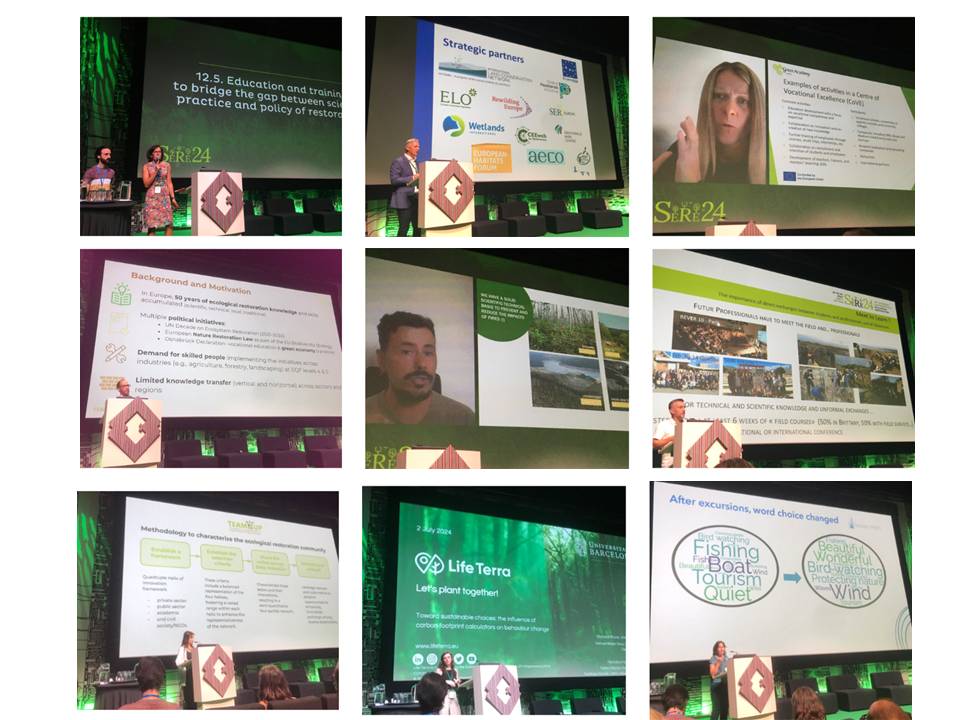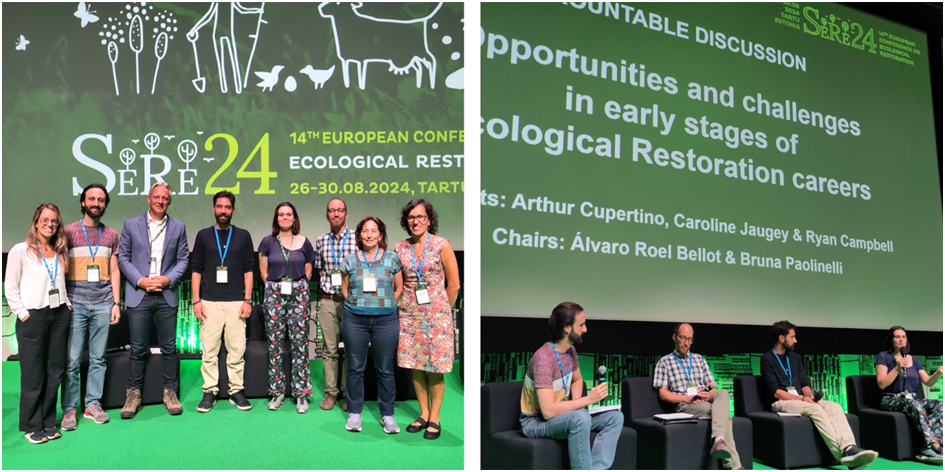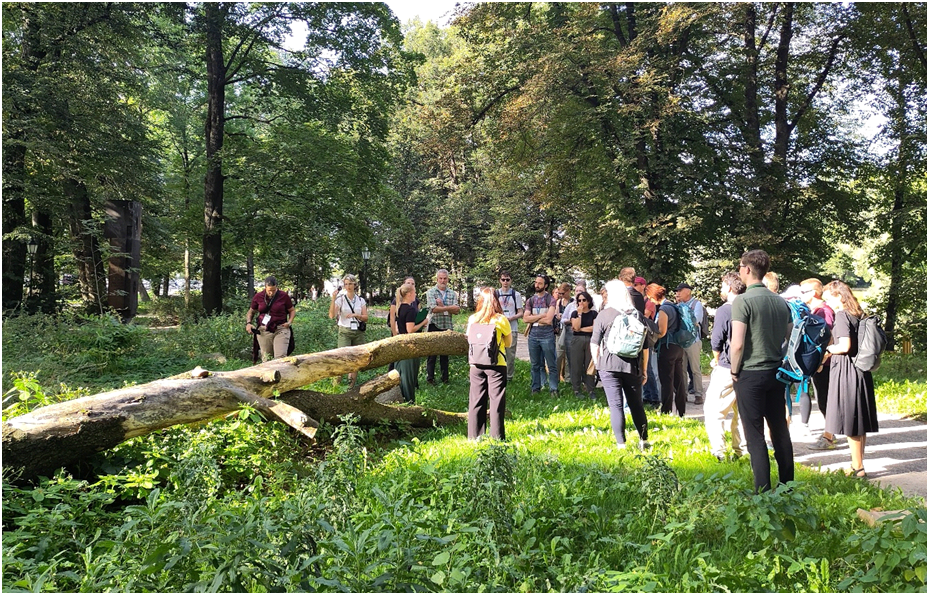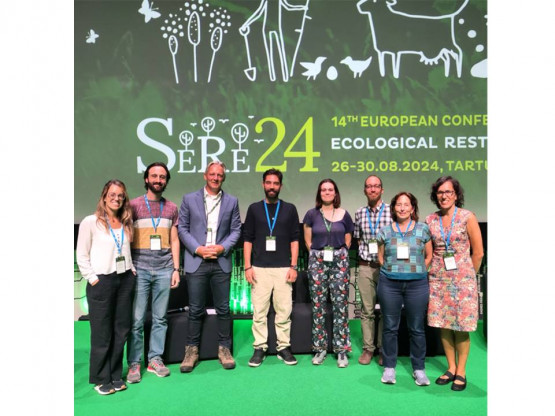by Bruna Paolinelli Reis, Patricia María Rodríguez González, Álvaro Roel Bellot
On August 28th, 2024, during the 14th European Conference on Ecological Restoration held in Tartu, Estonia, the Working Group on Education and Training of the European Chapter of the Society for Ecological Restoration (SERE), alongside the TEAM#UP project and YOUNG#ER network, organized a hybrid session titled Education and Training to Bridge the Gap Between the Science, Practice, and Policy of Restoration. This session included oral presentations and a round-table, followed by a half-day tour and workshop in collaboration with the urbanLIFEcircles project, where participants visited restoration actions in Tartu’s urban green areas.
The session (which was recorded and is available here: SERE2024 Session Link), chaired by Patricia María Rodríguez González (WGET) and Álvaro Roel Bellot (YOUNG#ER), explored how to better exchange ecological restoration knowledge between academia, practitioners, and policymakers. This was done with an emphasis on multidisciplinarity, education, training, and the active engagement of early career professionals.
The session had two sections:
- A series of oral presentations on education and training by invited speakers from the academic, practice, and policy sectors (Fig. 1)
- A round table discussion exploring the challenges and opportunities faced by ecological restoration professionals in the early stages of their careers.
 Fig. 1. Invited speakers from the different sectors (academia, practice and policy) sharing their Education and training experiences.
Fig. 1. Invited speakers from the different sectors (academia, practice and policy) sharing their Education and training experiences.
The roundtable discussion was hosted by SERE’s YOUNG#ER network and chaired by Álvaro Roel Bellot and Bruna Paolinelli Reis. In it, panellists from the practice (Ryan Campbell), academic (Arthur Cupertino) and policy (Caroline Jaugey) sectors, shared insights from their early careers, creating a safe space to discuss the opportunities and challenges of starting a career in restoration (Fig. 2).
 Fig. 2. Organizing team and roundtable discussion.
Fig. 2. Organizing team and roundtable discussion.
In the afternoon, a half-day tour titled Tartu Parks and Urban Nature took participants on a walk through Tartu showcasing some of the urban restoration activities happening in the streets and parks of the city (Fig 3). The tour was led by members of the urbanLIFEcircles project, a collaboration between the cities of Tartu, Riga and Aarhus demonstrating systematic approaches for biodiversity-oriented management of urban spaces. The tour concluded with a one-hour workshop facilitated by YOUNG#ER members Álvaro Roel Bellot and Bruna Paolinelli Reis, and early career professionals Arthur Cupertino, Polina Degtjarenko, and Marcello De Vitis.
 Fig. 3. Half day tour participants listening to urbanLIFEcircles project guide during stop at the Vabaduse urban grove in Tartu.
Fig. 3. Half day tour participants listening to urbanLIFEcircles project guide during stop at the Vabaduse urban grove in Tartu.
The workshop featured a focus-group discussion on effective communication strategies for urban ecosystem restoration initiatives, considering potential public misconceptions. The nineteen participants were split into five teams. They were then tasked with proposing education and communication strategies for different audiences (e.g., the broader public, scientists, policy makers, etc.) and urban restoration scenarios (e.g., restoring grassland or forests in city parks). Facilitators introduced a new scenario to each team, asking participants to build upon previous suggestions to avoid repetition. The workshop concluded with a group discussion where facilitators summarized the teams' findings (Fig 4). A detailed report of the workshop’s outcomes and strategies developed for each scenario can be found here.
 Figure 4. a) Workshop planning with facilitators; b) focus-group discussion; c) wrap-up with summary of key insights from the groups.
Figure 4. a) Workshop planning with facilitators; b) focus-group discussion; c) wrap-up with summary of key insights from the groups.
All in all, the day offered a great showcase of SERE’s members work on education and training, Tartu’s commitment to urban ecosystem restoration, and the opportunities and challenges facing those building a career in ecological restoration. Along with the rest of the conference, this offered the insights and excitement needed to keep us fueled until the next SERE gathering!
